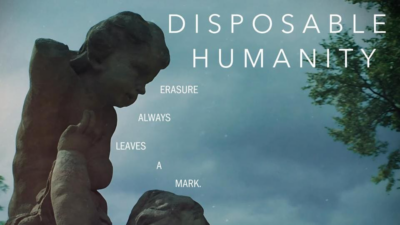Film Takes Home Two Slamdance Awards, Underscoring Relevance of Film Today
 Cameron S. Mitchell’s documentary feature Disposable Humanity premiered during the 2025 Slamdance Film Festival in Los Angeles. This film took home the 2025 Slamdance Unstoppable Feature Honorable Mention as well as a 2025 Audience Award, voted on by Slamdance attendees, underscoring the relevance of the film today.
Cameron S. Mitchell’s documentary feature Disposable Humanity premiered during the 2025 Slamdance Film Festival in Los Angeles. This film took home the 2025 Slamdance Unstoppable Feature Honorable Mention as well as a 2025 Audience Award, voted on by Slamdance attendees, underscoring the relevance of the film today.
Disposable Humanity examines the Nazi-run Aktion T4 program, which began in 1939. By 1945, Nazis had murdered more than 300,000 disabled people.
50 years later, filmmaker Cameron S. Mitchell and his parents David Mitchell and Sharon Snyder, both of whom are disability studies professors, researched the Nazi Aktion T4 program, recording conversations with memorial directors, disabled people, and relatives of T4 victims. Over 22 years of research, they learned that Nazis used the Aktion T4 program to build the first gas chambers and to train medical staff to become executioners. Ultimately, this program became the apparatus of mass murder used during the Holocaust.
During the time of them conducting their research, the Mitchell family faced the lack of accessibility in the region. When traveling to Auschwitz via train, while very different from the cattle cars used to transport people during the Holocaust, David encountered concerns accessing the train due to his disability and usage of a power wheelchair – showing a lack of accessibility remains today. Later, at the Bernburg Memorial, the Mitchell family became the first disabled individuals from outside of the institution to visit. They found the area was inaccessibile, noting that the Nazis brought disabled people to die there but it was not even accessible for them to get inside.
Mitchell utilizes music shifts to show darkness, including when viewers learn about Hartheim Castle, located in upper Austria. Since 1898, disabled people had lived in this building. During this time, doctors encouraged parents to abandon children born with disabilities to live in a home for disabled children, where they were categorized as “educatable children” and “non-educatable children,” and later deemed as “too disabled to be able to do productive work.”
The documentary examines how media was used to dehumanize disabled people, saying those who are disabled and with mental health conditions were a threat to society. During the Holocaust, state-run media pushed the agenda that if disabled individuals no longer existed, then other members of society would have access to larger homes and other resources.
Throughout the film, Disposable Humanity illustrates how easy it was to shift public opinion leading the general public to view disabled people as less than and believing disabled individuals were better off dead. Disposable Humanity gives viewers today an important warning in not allowing oneself to dehumanize a segment of the population. Throughout the film, the Mitchells honors those killed during the Aktion T4 program, reclaiming the lives lost.
The film’s end credits encourage viewers to not just learn but internalize and not let history repeat itself: “Aktion T4 catalyzed the Holocaust. The Holocaust is a part of disability history. Do not look away, share what you’ve learned.”
Disposable Humanity screened twice during the 2025 Slamdance Film Festival in Los Angeles and is available through the virtual film festival until March 7. The film played with open captions and had audio description available for those who brought headphones and had pre-downloaded the all4access app.






